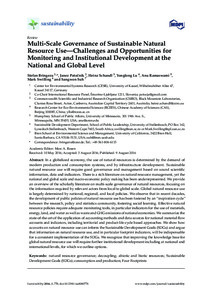| dc.date.accessioned | 2016-11-09T14:18:12Z | |
| dc.date.available | 2016-11-09T14:18:12Z | |
| dc.date.issued | 2016-08-09 | |
| dc.identifier.issn | 2071-1050 | |
| dc.identifier.uri | urn:nbn:de:hebis:34-2016110951393 | |
| dc.identifier.uri | http://hdl.handle.net/123456789/2016110951393 | |
| dc.description.sponsorship | Gefördert durch den Publikationsfonds der Universität Kassel | |
| dc.language.iso | eng | |
| dc.rights | Urheberrechtlich geschützt | |
| dc.rights.uri | https://rightsstatements.org/page/InC/1.0/ | |
| dc.subject | natural resource governance | eng |
| dc.subject | decoupling | eng |
| dc.subject | abiotic and biotic resources | eng |
| dc.subject | Sustainable Development Goals (SDGs) | eng |
| dc.subject | consumption and production | eng |
| dc.subject | Four Footprints | eng |
| dc.subject.ddc | 630 | |
| dc.title | Multi-Scale Governance of Sustainable Natural Resource Use—Challenges and Opportunities for Monitoring and Institutional Development at the National and Global Level | eng |
| dc.type | Aufsatz | |
| dcterms.abstract | In a globalized economy, the use of natural resources is determined by the demand of modern production and consumption systems, and by infrastructure development. Sustainable natural resource use will require good governance and management based on sound scientific information, data and indicators. There is a rich literature on natural resource management, yet the national and global scale and macro-economic policy making has been underrepresented. We provide an overview of the scholarly literature on multi-scale governance of natural resources, focusing on the information required by relevant actors from local to global scale. Global natural resource use is largely determined by national, regional, and local policies. We observe that in recent decades, the development of public policies of natural resource use has been fostered by an “inspiration cycle” between the research, policy and statistics community, fostering social learning. Effective natural resource policies require adequate monitoring tools, in particular indicators for the use of materials, energy, land, and water as well as waste and GHG emissions of national economies. We summarize the state-of-the-art of the application of accounting methods and data sources for national material flow accounts and indicators, including territorial and product-life-cycle based approaches. We show how accounts on natural resource use can inform the Sustainable Development Goals (SDGs) and argue that information on natural resource use, and in particular footprint indicators, will be indispensable for a consistent implementation of the SDGs. We recognize that improving the knowledge base for global natural resource use will require further institutional development including at national and international levels, for which we outline options. | eng |
| dcterms.accessRights | open access | |
| dcterms.bibliographicCitation | In: Sustainability. - Basel : MDPI. - 2016, 8, 778 | |
| dcterms.creator | Bringezu, Stefan | |
| dcterms.creator | Potočnik, Janez | |
| dcterms.creator | Schandl, Heinz | |
| dcterms.creator | Lu, Yonglong | |
| dcterms.creator | Ramaswami, Anu | |
| dcterms.creator | Swilling, Mark | |
| dcterms.creator | Suh, Sangwon | |
| dc.relation.doi | doi:10.3390/su8080778 | |

